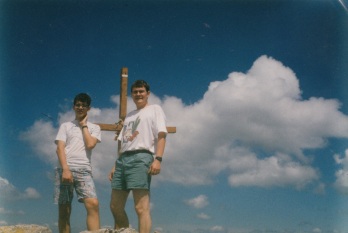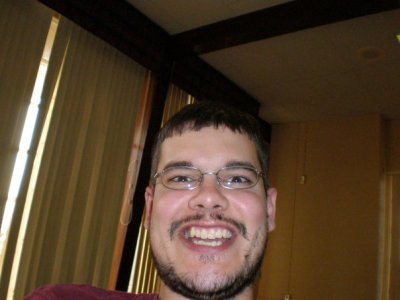 Father, sometimes you and I
Father, sometimes you and I
are like a three-legged horse
who can’t get across the finish line
no matter how hard he tries and tries and tries
– Jim Boyd
I am my father, and my father was me.
A little over two years ago, I sat down with my parents in the living room of their Lacy Lakeview rental house, and told them about my journey away from the Christian faith so dear to them. Former Southern Baptist missionaries to Argentina, their first response, understandably, was self-recrimination: where did we go wrong? Why was I abandoning a worldview to which they had dedicated so much of their own lives, and which they had tried so hard to instill in mine?
Was this their doing?
Well, in a way, yes–but not in the way they feared. Theirs was no failure, at least not as I see it; theirs was a resounding success.
The photo above was taken in 1989. My dad and I had just finished climbing Cerro Uritorco, Córdoba Province, for the first time. It was my birthday; I was 12 years old. My dad was the same age then that I am now. This was a big moment for us, the start of an annual tradition: every year, on or around my birthday, we would climb that mountain together.
As with all fathers and sons, my relationship with my father has had its ups and downs. We have been climbing mountains, of one sort or another, my whole life. Both of us possess a quick and violent temper, and as a teenager I learned to push his buttons, and he mine. Both of us are by nature stubborn, and fairly convinced of the superiority of our own processes, which have rarely ever been the same, which fact also caused a decent amount of conflict back in the day. And then there’s the old “man-child” dilemma: in his eyes (and to a certain extent, in my own), I will forever be the young’un, in need of guidance and correction, with ideas in formation but not yet fully formed. This makes adult communication difficult. We have bridged this divide a bit in the last few years, but I suspect it is one that is never quite overcome between fathers and their sons.
I inherited many negative characteristics from my father. We all do. In the past I have, to my discredit, tended to focus on those. Ironically, it wasn’t until I turned from his dearly held beliefs that I truly began to appreciate the gifts this Christian man had given me. This is, by the way, why I take so personally the generalizing negative comments about Christian folk when I come across them on the blogs: I no longer embrace my father’s worldview, but this does not blind me to the fact that he is a good man, not in spite of his faith but because of it. And, although I no longer share that faith, I am who I am in large measure because of it, as well.
Whatever love I have for my fellow human beings, I have because my parents taught me that the needs and pain of others are always more important than my own. They lived that out, giving up their own plans to go to a foreign place and work for others. I may not agree with how they did it, but I have to honor why they did it.
My father gave me my sense of humor, and that sense of humor has gotten me through any number of tough situations. He taught me that no monster can kill you when you can tickle its belly and make it laugh.
My love of reading comes from him. He gave me Dickens, and Twain, and Dumas: I loved them well before the age when high school students learn to hate them. And with a love of reading comes a love of words, and of ideas. My father taught me the importance of using words correctly and well, and of respecting the ideas of others without letting them get in the way of forming my own.
As a child, he took me out of my comfort zone and, by doing so, literally gave me the world. If my perspective is broad, it is because of the places he took me, and if I have been many places, it is because he encouraged me to go.
Above all else, like ol’ Polonius, he taught me to be true to myself, and he taught me to love truth. And here I am. I may not have chosen his truth, but I would not have arrived (and be arriving) at my own truth if not for his. If not for the Christian man who taught me to stand for what I believe, whatever that may be. Without him, the Toad would never have been born. If I am a good man, it is because it takes one to make one.
One might argue that, in all this, I went out the back door to get to the front yard. This is most definitely not what either one of us expected when we stood together on that mountaintop 26 years ago. We could see a long way from up there, but we couldn’t see forever. But this is what counts: no matter how many mountains I summit in my life, no matter how many different paths I take, I’ll never be alone. We’ll be standing there, together, and I’ll be the stronger for it.
So, yes, Dad. You did this. And for that I am eternally grateful.













